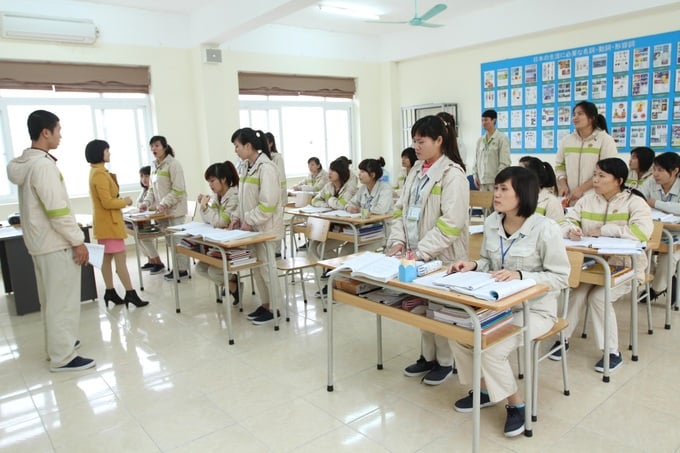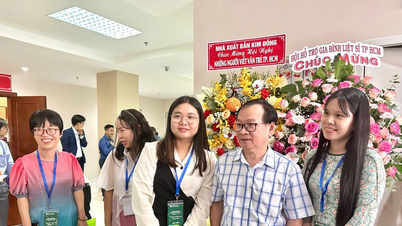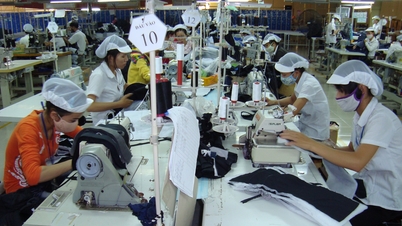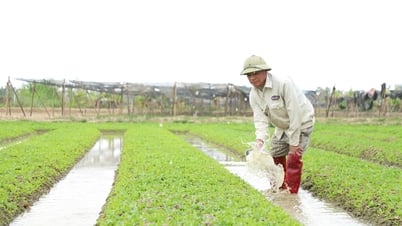(LĐXH) - With more than 158,000 workers going to work abroad, 2024 is considered a successful year for labor export. However, the weaknesses of Vietnamese workers are still foreign languages and discipline.
Expand more high-income markets with good working conditions
According to statistics from businesses, the total number of Vietnamese workers working abroad in 2024 is 158,588 people, reaching 126.9% of the annual plan;
Of which, the Japanese market has 71,518 workers, Taiwan (China) 62,282 workers, South Korea 13,649 workers, China 2,335 workers, Hungary 759 workers, Singapore 1,544 workers, Romania 1,023 workers, Poland 331 workers, Hong Kong 582 workers, Algeria 397 workers, Saudi Arabia 660 workers, Russian Federation 591 workers, Macao 346 workers and other markets.

Mr. Pham Viet Huong, Deputy Director of the Department of Overseas Labor Management (Ministry of Labor, Invalids and Social Affairs) said that Vietnamese workers work abroad in many types, industries and jobs such as: Manufacturing (mechanics, textiles, leather shoes, electronics assembly...), construction, agriculture, fisheries (fishing and aquaculture), services (caring for the elderly, sick people, domestic help).
Good working and living conditions, guaranteed welfare.
Regarding labor income, it is quite high and stable, ranging from 1,200 - 1,600 USD/month in the Japanese and Korean markets; from 800 - 1,200 USD/month in Taiwan (China) and European countries; from 700 - 1,000 USD/month for skilled labor and from 500 - 600 USD/month for unskilled labor in the Middle East and African markets...
According to Mr. Pham Viet Huong, in recent years, Japan has been the leading market for receiving Vietnamese workers in many fields. The number of Vietnamese workers going to work in Japan accounts for 50% of the total number of workers going to work abroad every year.
Since 2023, Vietnam has surpassed China to become the largest group of foreign workers in Japan with 518,364 people, an increase of 63.6% in 5 years. Many programs and projects such as: Technical Internship Program; Specific Skilled Worker Program;
The program to send Vietnamese nurses and caregivers to work in Japan under the Vietnam - Japan Economic Partnership Agreement (VJEPA)... has been implemented by the Vietnamese Ministry of Labor, Invalids and Social Affairs in coordination with the Japanese side and achieved many results.
Vietnam and Japan are implementing a labor market information project for migrant workers through the Japan International Cooperation Agency (JICA) to increase transparency in the recruitment process and prevent intermediary service providers from illegally collecting fees. The project is expected to be completed this year.
In the Korean market, the EPS Program to send workers to Korea this year also attracted a large number of Vietnamese workers to register for the exam. In 2024, the number of registrants was nearly 46,000, the year recording the highest number of workers participating in the exam in the past 10 years.
Evaluating the results of sending workers to work abroad in 2024, the Ministry of Labor, Invalids and Social Affairs said that the activity of sending workers to work abroad has recovered rapidly. The number of workers going to work abroad under contracts has gradually increased and improved in quality, bringing in significant foreign currency revenue to serve the socio-economic development of the country.
According to statistics from the Ministry of Labor, Invalids and Social Affairs, the country has more than 700,000 workers working in 50 countries and territories, sending back about 4 billion USD each year.
Besides traditional labor markets such as Taiwan (China), Japan, and South Korea, which continue to be stable, some new markets are in need of Vietnamese workers, such as Eastern European countries: Romania, Hungary, Poland, Slovakia, Serbia, etc.
In 2024, the Ministry of Labor, Invalids and Social Affairs will continue to expand and develop a number of labor markets such as Australia and the European region. Currently, the number of workers working in this market is not large, but the working conditions and income are relatively good.
“Recently, many countries such as Germany, Greece, Hungary, Romania, Poland, Russia, Czech Republic, Finland... have promoted labor cooperation with Vietnam through meetings, working sessions and negotiations between government agencies.
In addition to the above markets, many service enterprises are also approaching markets such as Spain, Lithuania... to send workers to work. The European region is always considered a key market, with a need to receive a large number of foreign workers, including Vietnamese workers.
"Vietnamese workers have initially created prestige and brand in the international labor market," said Deputy Minister of Labor, Invalids and Social Affairs Nguyen Ba Hoan.
Building a brand for Vietnamese workers
According to Deputy Minister Nguyen Ba Hoan, in addition to the achieved results, labor export activities also face many difficulties. Currently, many key labor export markets of Vietnam have changed their policies towards higher and stricter requirements in terms of expertise, skills and foreign languages.
Besides, the Japanese and Korean markets... also have changes in policies to attract foreign workers.
In highly skilled occupations such as engineering, information technology, and mechanics, the number of Vietnamese workers who meet these requirements is still very small. This causes workers to be limited to common jobs, with low incomes and few opportunities for advancement. Therefore, the work of sending workers abroad to work will have to follow the new international trend.
According to experts, in the context of deep integration, there will be no simple jobs, high salaries and short-term training. Therefore, improving foreign language proficiency and skills is an important factor for workers to be able to access the market with good working conditions and high income.
Improving the quality of workers going to work abroad not only brings personal benefits but also has a positive impact on the national economy, improving the skills of the workforce and promoting sustainable development in many fields.
Highly skilled workers working abroad will contribute to enhancing the image of the country, while promoting cooperation and cultural exchange between countries.
As a unit specializing in training and sending workers to work abroad, especially in the Japanese market, Mr. Nguyen Xuan Lanh, Deputy General Director of Esuhai Group, said that since its establishment, the company has established a foreign language training school for workers so that they can quickly adapt, do their jobs well, and acquire new skills and management methods.
Not stopping at sending workers to work abroad, Esuhai Group also builds an ecosystem to receive them back, creating jobs for workers after studying and working abroad.
Mr. Nguyen Nhat Anh, co-founder of Viettalents GmbH (Germany) Human Resources Training and Development Company, said that the shortage of human resources in the healthcare sector in European countries is opening up study and work opportunities for Vietnamese workers.
Meanwhile, many European countries are in need of human resources, so policies to attract immigrant workers have changed a lot. Germany and other European countries have preferential policies for fields that need highly qualified human resources.
Enterprises need to proactively coordinate with schools and educational institutions to develop human resource training programs for the health sector, including foreign language training to improve labor quality in the face of competition from human resources from other countries.
Regarding the quality of Vietnamese workers working abroad, Mr. Nguyen Gia Liem, former Deputy Director of the Department of Overseas Labor Management, said that in recent years, we have focused more on supporting poor and disadvantaged workers, workers in coastal areas, islands, etc.
“The first weakness of Vietnamese workers today is foreign languages and a sense of discipline. This is an issue that has been raised many times in the past, directly affecting the quality of workers working abroad. Being good at the native language will help workers have better job positions and higher incomes.
Not only that, having knowledgeable and qualified workers is also a factor that helps them have a more stable position at work when a crisis occurs. For example, during the Covid-19 pandemic, unskilled workers will be cut, but competent workers will still be retained.
The current solution, according to Mr. Liem, is to have a policy to improve the quality of labor resources, allocate financial resources to invest in facilities for schools and vocational training facilities, and support workers to study to improve their technical expertise, vocational skills, and foreign languages.
It will depend on each market to determine what career to study or what level and level of foreign language to study.
“We are aiming not only to increase the number of workers going to work abroad but also to improve the quality of the workforce. Therefore, improving the quality of the workforce is a top priority. This not only helps increase income but also creates a prestigious brand for Vietnamese workers,” Mr. Liem emphasized.
Thai An
Labor and Social Newspaper Spring At Ty
Source: https://dansinh.dantri.com.vn/nhan-luc/xuat-khau-lao-dong-but-pha-nhung-van-con-diem-yeu-ve-ngoai-ngu-ky-luat-20250121100201245.htm


![[Photo] President Luong Cuong attends the inauguration of the international container port in Hai Phong](https://vphoto.vietnam.vn/thumb/1200x675/vietnam/resource/IMAGE/2025/5/13/9544c01a03e241fdadb6f9708e1c0b65)
![[Photo] President Luong Cuong awarded the title "Heroic City" to Hai Phong city](https://vphoto.vietnam.vn/thumb/1200x675/vietnam/resource/IMAGE/2025/5/13/d1921aa358994c0f97435a490b3d5065)
![[Photo] Many people in Hanoi welcome Buddha's relics to Quan Su Pagoda](https://vphoto.vietnam.vn/thumb/1200x675/vietnam/resource/IMAGE/2025/5/13/3e93a7303e1d4d98b6a65e64be57e870)
![[Photo] Prime Minister Pham Minh Chinh receives Ambassador of the French Republic to Vietnam Olivier Brochet](https://vphoto.vietnam.vn/thumb/1200x675/vietnam/resource/IMAGE/2025/5/13/f5441496fa4a456abf47c8c747d2fe92)

























































































Comment (0)